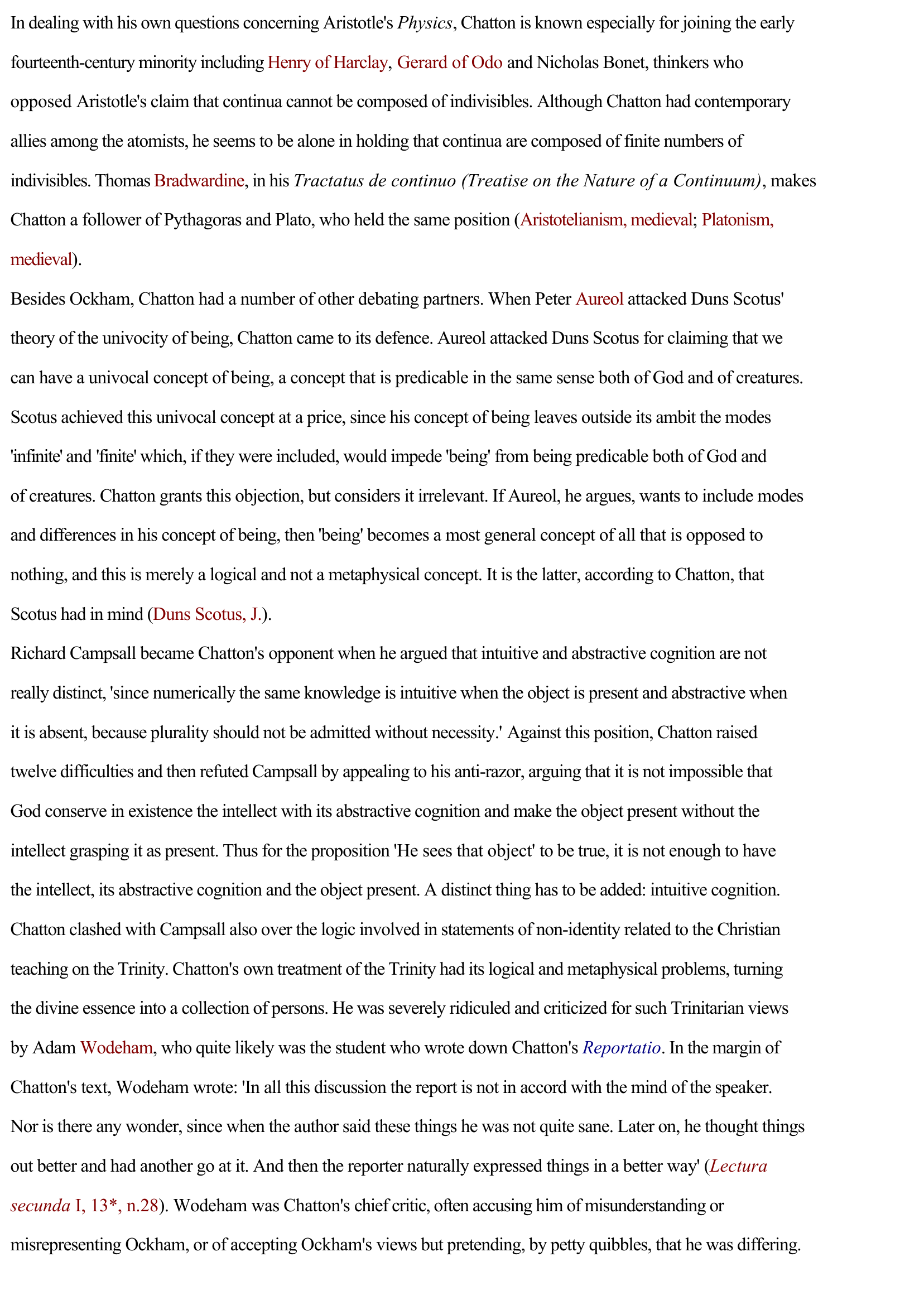Chatton, Walter
Publié le 22/02/2012
Extrait du document
«
In dealing with his own questions concerning Aristotle's Physics , Chatton is known especially for joining the early
fourteenth-century minority including Henry of Harclay , Gerard of Odo and Nicholas Bonet, thinkers who
opposed Aristotle's claim that continua cannot be composed of indivisibles.
Although Chatton had contemporary
allies among the atomists, he seems to be alone in holding that continua are composed of finite numbers of
indivisibles.
Thomas Bradwardine , in his Tractatus de continuo (Treatise on the Nature of a Continuum) , makes
Chatton a follower of Pythagoras and Plato, who held the same position ( Aristotelianism, medieval ; Platonism,
medieval ).
Besides Ockham, Chatton had a number of other debating partners.
When Peter Aureol attacked Duns Scotus'
theory of the univocity of being, Chatton came to its defence.
Aureol attacked Duns Scotus for claiming that we
can have a univocal concept of being, a concept that is predicable in the same sense both of God and of creatures.
Scotus achieved this univocal concept at a price, since his concept of being leaves outside its ambit the modes
'infinite' and 'finite' which, if they were included, would impede 'being' from being predicable both of God and
of creatures.
Chatton grants this objection, but considers it irrelevant.
If Aureol, he argues, wants to include modes
and differences in his concept of being, then 'being' becomes a most general concept of all that is opposed to
nothing, and this is merely a logical and not a metaphysical concept.
It is the latter, according to Chatton, that
Scotus had in mind ( Duns Scotus, J. ).
Richard Campsall became Chatton's opponent when he argued that intuitive and abstractive cognition are not
really distinct, 'since numerically the same knowledge is intuitive when the object is present and abstractive when
it is absent, because plurality should not be admitted without necessity. ' Against this position, Chatton raised
twelve difficulties and then refuted Campsall by appealing to his anti-razor, arguing that it is not impossible that
God conserve in existence the intellect with its abstractive cognition and make the object present without the
intellect grasping it as present.
Thus for the proposition 'He sees that object' to be true, it is not enough to have
the intellect, its abstractive cognition and the object present.
A distinct thing has to be added: intuitive cognition.
Chatton clashed with Campsall also over the logic involved in statements of non-identity related to the Christian
teaching on the Trinity.
Chatton's own treatment of the Trinity had its logical and metaphysical problems, turning
the divine essence into a collection of persons.
He was severely ridiculed and criticized for such Trinitarian views
by Adam Wodeham , who quite likely was the student who wrote down Chatton's Reportatio .
In the margin of
Chatton's text, Wodeham wrote: 'In all this discussion the report is not in accord with the mind of the speaker.
Nor is there any wonder, since when the author said these things he was not quite sane.
Later on, he thought things
out better and had another go at it.
And then the reporter naturally expressed things in a better way' (Lectura
secunda I, 13*, n.28 ).
Wodeham was Chatton's chief critic, often accusing him of misunderstanding or
misrepresenting Ockham, or of accepting Ockham's views but pretending, by petty quibbles, that he was differing..
»
↓↓↓ APERÇU DU DOCUMENT ↓↓↓
Liens utiles
- Le personnage de SHANDY Walter
- ROB ROY (Robert Campbell Mac-Gregor dit). Personnage de Rob Roy de Walter Scott.
- ANNE DE GEIERSTEIN ou La fille des brumes de Walter Scott (résumé & analyse)
- Walter de la Mare : VERRE BRÛLANT (Le) ET AUTRES POÈMES [The Burning Glass and Other Poems]. (résumé)
- PIRATE (Le) de Walter Scott (résumé)

































